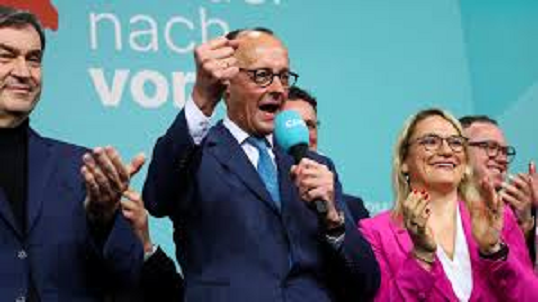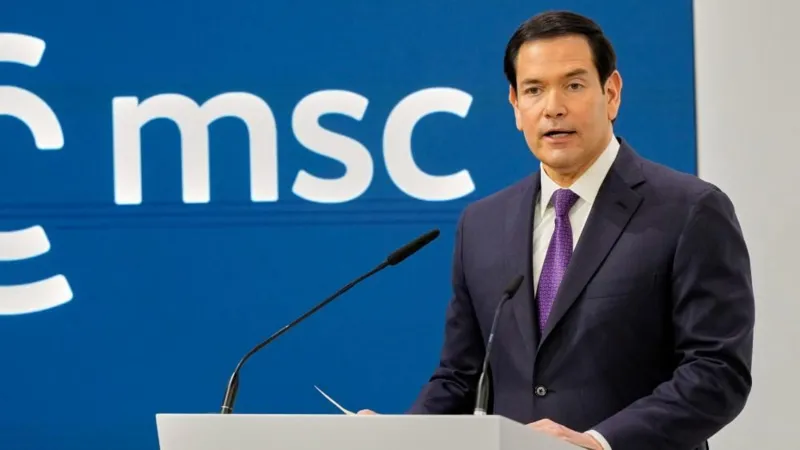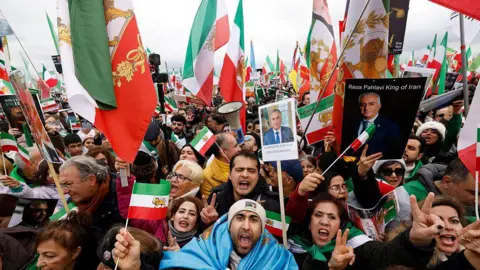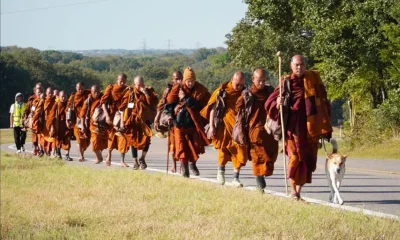Foreign News
Germany’s conservatives celebrate, but far right enjoy record result

Friedrich Merz‘s conservatives have won Germany’s election, well ahead of rival parties but short of the 30% vote-share they had expected.
“Let’s celebrate tonight and in the morning, we’ll get to work,” he told cheering supporters. His immediate priority is to try to form a government with the third-placed Social Democrats of Olaf Scholz.
Even before the result was clear, Merz said his top priority was unity in Europe, so that “step by step, we can really achieve independence from the US”.
The other big winner in Sunday’s vote was the far-right Alternative for Germany (AfD), who are celebrating a record second-place result of 20.8%.
The AfD’s candidate for chancellor, Alice Weidel, did a victory lap of her supporters, but even her party had hoped for a greater result and the mood at AfD HQ was subdued.
Merz, 69, has never held a ministerial job, but he has promised if he becomes the next German chancellor to show leadership in Europe and beef up support for Ukraine.
Most Germans have been shocked by President Donald Trump’s conduct towards Ukraine and Europe and Friedrich Merz said the US leader had shown “the Americans are largely indifferent to the fate of Europe”.
Trump has labelled Ukraine’s leader a “dictator” and two of his leading figures have openly backed the AfD in the run-up to the vote. Vice-President JD Vance was accused of meddling in the vote during a visit to Munich, while billionaire Elon Musk has made repeated remarks on his X platform.
Friedrich Merz’s first priority will be to try to form a coalition made up of his Christian Democrats (and their Bavarian sister party, the CSU) and Scholz’s centre left, despite the Social Democrats’ worst-ever showing of 16.4%.
Merz’s CDU party leadership will meet on Monday and so will the Social Democrat SPD’s, separately, but Scholz will not take part in the talks.
Merz is keen to form a government by Easter. It could be possible, because between the two parties, they have 328 seats, a majority of 12 in the 630-seat parliament.
But it was not until the early hours of Monday that that became clear.
After the collapse of Olaf Scholz’s three-party coalition late last year, Merz had asked the electorate for a strong mandate to form a clear-cut coalition with one other party.
In the event, he secured enough seats only because two of the smaller parties failed to get into parliament.
A two-party coalition would enable him to solve as many of Germany’s problems as he could in four years, he said, from a stagnant economy to closing its borders to irregular migrants.
German voters had other ideas. They came out in big numbers, with a 83% turnout not seen since before reunification in 1990.
Merz’s Christian Democrats had been looking for more than the 28.6% of the vote they and their Bavarian sister party received.
His most likely partner was always going to be the Social Democrats – known in Germany as a GroKo, or grand coalition.
But Germany’s electorate has fractured, and the two big beasts of its post-war politics can no longer be sure of success.
The AfD under Alice Weidel enjoyed a 10-point increase in support on four years ago, their support boosted by anger over high prices and a series of deadly attacks in German cities.
Three took place during the election campaign.
Weidel also benefited from a successful TikTok campaign that drew in big numbers of young voters.
As results came in during the early hours of Monday, it became clear the AfD was far ahead of the other parties in the east, with a projected 34%, according to a survey for public broadcaster ZDF.
“Germans have voted for change,” said Weidel. She said Friedrich Merz’s attempt to forge a coalition would ultimately end in failure: “We’ll have fresh elections – I don’t think we’ll have to wait another four years.”
But just as the election map turned light blue in the east, much of the rest of Germany turned black – the colour of the CDU.
And Merz dismissed the rise of the AfD out of hand. “The party only exists because there have been problems that haven’t been solved. They’re happy if these problems get worse and worse.”
“We need to solve the problems… then that party, the AfD, will disappear.”
Merz was equally withering towards the new Trump administration.
President Trump did welcome Merz’s victory. He said it was proof that Germans were, like Americans, tired of “the no common sense agenda, especially on energy and immigration”.
If it was an overture, Merz did not take it as one. He told a round-table TV discussion on Sunday night that the interventions from Washington had been “no less dramatic and drastic and ultimately outrageous than the interventions we have seen from Moscow”.
Last week, Trump appeared to accuse Kyiv of starting the war which Russia unleashed on its neighbour exactly three years ago.
Merz’s victory was quickly welcomed by leaders across much of Europe. France’s Emmanuel Macron spoke of uniting at a time of uncertainty to “face the major challenges of the world and our continent”, while the UK’s Sir Keir Starmer sought to “enhance our joint security and deliver growth for both our countries”.
Friedrich Merz’s Christian Democrats continue to rely on older voters for their success, while voters aged 18-24 appear to be far more interested in both the AfD and another party, the Left, which surged in the polls in recent weeks.
Not long ago, the Left was heading out of the parliament, with poll numbers well below the 5% threshold.
But a series of TikTok videos showing co-leader Heidi Reichinnek giving fiery speeches in parliament went viral and they ended up close to 9%, and a quarter of the younger vote, according to an ARD survey.
[BBC]
Foreign News
Rubio says US and Europe ‘belong together’ despite tensions

Marco Rubio has assured European leaders the US does not plan to abandon the transatlantic alliance, saying its destiny “will always be intertwined” with the continent’s.
The US secretary of state told the Munich Security Conference: “We do not seek to separate, but to revitalise an old friendship and renew the greatest civilisation in human history.”
He criticised European immigration, trade and climate policies, but the overall tenor of the closely-watched speech was markedly different to Vice President JD Vance’s at the same event last year, during which he scolded continental leaders.
European Commission President Ursula von der Leyen said she was “very much reassured” by Rubio’s remarks.
Rubio, the Trump administration’s most senior diplomat, said it was “neither our goal nor our wish” to end the transatlantic partnership, adding: “For us Americans, our home may be in the Western Hemisphere, but we will always be a child of Europe.
“And I am here today to leave it clear that America is charting the path for a new century of prosperity, and that once again we want to do it together with you, our cherished allies and our oldest friends.”
However, he repeated several criticisms repeatedly levelled at Europe by the Trump administration, including describing immigration policies as a threat to civilisation, and saying a “climate cult” had taken over economic policy.
On trade, he said Europe and the US had “made mistakes together” by adopting a “dogmatic vision of free and unfettered trade”.
He repeated familiar calls from the US for Europe to invest more in defence, saying: “We want allies who can defend themselves so that no adversary will ever be tempted to test our collective strength.”
In response, von der Leyen said: “Rubio is a good friend, a strong ally. And this was, for me, very reassuring to listen to him.”
She continued: “We want a strong Europe. And this is, I think, the message of today.”
Elsewhere in his half-hour address, Rubio said the system of international co-operation “must be rebuilt” and singled out the UN for particular criticism, saying it had “played virtually no role” in resolving the Gaza and Ukraine conflicts.
He also said the organisation was “powerless to constrain the nuclear programme” of Tehran.
In recent weeks, US President Donald Trump has threatened strikes on Iran if a deal to curb its nuclear programme can be reached, as negotiations between the two intensify.
A second round of talks will be hosted by Oman in Geneva next week, the Swiss foreign ministry said on Saturday.
Outside the conference, an estimated 200,000 protesters held a rally against the Iranian government, local police report.
The demonstrators denounced the country’s leadership, following the government crackdown on January’s protests in which thousands of people were killed.

Rubio also said the US did not know whether the “Russians are serious about ending the war” in Ukraine, before adding: “But we’re going to continue to test it.”
Ukraine’s President Volodymyr Zelensky told the conference later on Saturday that no one in Ukraine believed his Russian counterpart Vladimir Putin would leave the country alone, describing the Russian leader as a “slave to war”.
Zelensky has come under pressure from the White House to hold presidential elections, which have been suspended while the country is under martial law.
Asked about a Financial Times report that his administration was planning for elections as soon as May, Zelensky said it was “something new to me” and repeated that “nobody supports elections during the war”.
He said that Ukraine would need “two months of ceasefire” and “security infrastructure” to safely conduct elections.
[BBC]
Foreign News
Two Britons among three dead in French Alps avalanche

Two Britons and one French person have died in an avalanche in the French Alps on Friday.
The British pair were part of a group of five people skiing off-piste with an instructor in the Manchet valley, near Val d’Isère, a spokeswoman for the resort told the BBC.
The French national was skiing alone when the avalanche struck at 11:30 local time (10:30 GMT), Albertville prosecutor Benoit Bachelet said in a statement announcing the deaths.
Another British person has minor injuries, he added.
A spokesperson for the Foreign Office told the BBC they are aware of the death of the two British men and they are “in contact with the local authorities and stand ready to offer consular assistance”.
A manslaughter investigation has now been launched by the Albertville public prosecutor’s office and will be carried out by CRS Alpes mountain rescue police.
The ski instructor, who was unharmed, tested negative after taking alcohol and drug tests, according to Bachelet.
Val d’Isère already experienced avalanches this winter, with one person dying in the resort of Tignes nearby last month.
France’s national weather service had issued a red alert for avalanche risk across the Savoie region on Thursday, which was then lifted on Friday. But the risk level remained high across the Alps with “very unstable snow cover”.
The avalanche comes in the wake of Storm Nils, which passed through France the day before, leaving between 60cm and 100cm of snow, the weather service said.
There have been a number of fatal avalanches in the region in recent weeks, including the death of a British man off-piste skiing at the La Plagne resort in January.
“We have had some very complicated, very unstable snow since the beginning of the season,” Luc Nicolino, slopes manager at La Plagne, told AFP.
“It’s a kind of mille-feuille with many hidden, fragile layers.”
[BBC]
Foreign News
Mexican ships arrive in Cuba with humanitarian cargo amid US oil blockade

Two Mexican ships bearing humanitarian aid have docked in the harbour of Cuba’s capital Havana, as the United States continues its efforts to cut the island off from outside fuel supplies.
On Thursday, pedestrians on Havana’s seawall watched as the ships, one of which was the Papaloapan, unloaded white pallets on shore.
Mexican President Claudia Sheinbaum addressed the delivery in her morning news conference, promising that more help was on the way.
“We are sending different forms of help, different forms of support,” Sheinbaum said. “Today, the ships arrive. When they return, we are going to send more support of a different type.”
She also described her country’s role as “opening the doors for dialogue to develop” between Cuba and the US, but she insisted that maintaining Cuba’s sovereignty would be paramount among her priorities.
Since January, the administration of US President Donald Trump has sought to cut off the oil supplies that power Cuba’s energy grid and other critical infrastructure.
The campaign is part of a long-running series of sanctions imposed by the US on the Caribbean island nation, stretching back to the Cold War.
But the latest effort, under Trump, has experts at the United Nations warning of an imminent humanitarian “collapse” in Cuba, as oil supplies dwindle.
The oil embargo began on January 3, when Trump authorised a US military operation to attack Venezuela and abduct its then-leader, President Nicolas Maduro, and his wife Cilia Flores.
[Aljazeera]
-

 Business5 days ago
Business5 days agoAutodoc 360 relocates to reinforce commitment to premium auto care
-

 Midweek Review5 days ago
Midweek Review5 days agoA question of national pride
-

 Life style14 hours ago
Life style14 hours agoMarriot new GM Suranga
-

 Opinion4 days ago
Opinion4 days agoWill computers ever be intelligent?
-

 Features14 hours ago
Features14 hours agoThe Rise of Takaichi
-

 Midweek Review5 days ago
Midweek Review5 days agoTheatre and Anthropocentrism in the age of Climate Emergency
-

 Editorial7 days ago
Editorial7 days agoThe JRJ syndrome
-

 Opinion5 days ago
Opinion5 days agoThe Walk for Peace in America a Sri Lankan initiative: A startling truth hidden by govt.













